|
|
|
Sort Order |
|
|
|
Items / Page
|
|
|
|
|
|
|
| Srl | Item |
| 1 |
ID:
131415
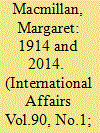

|
|
|
|
|
| Publication |
2014.
|
| Summary/Abstract |
The outbreak of the First World War remains a great historical puzzle and a source of concern, for if we do not understand how it came about we run the risk of stumbling into a similar catastrophe. This article draws parallels between the world of 1914 and the present. It starts with comfortable assumptions made by so many, then and now, that a major conflict was impossible or improbable and then looks at the paradox that globalization not only made the world more interdependent and linked, but also fostered intense local and national identities. It suggests factors that propelled Europe to war in 1914, including national rivalries, imperialism, the arms race and a shifting power balance between rising and declining powers, as well as ideologies and assumptions such as Social Darwinism and militarism, and points out that similar forces and ideas are present today. The article also stresses the dangerous complacency that can arise as a result of decision-makers having successfully dealt with a series of crises. European decision-makers also assumed that they could successfully use war as an instrument of policy and largely ignored or explained away the mounting evidence that the advantage in conflict was swinging to the defence. Again, as the author points out, there are disquieting parallels with the present.
|
|
|
|
|
|
|
|
|
|
|
|
|
|
|
|
| 2 |
ID:
129682
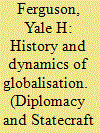

|
|
|
|
|
| Publication |
2014.
|
| Summary/Abstract |
Globalisation involves geographically wider transaction networks and has multiple interrelated dimensions. The globalisation process has geographical scope, volume and density of transactions, and a direction and pace of change. Globalization has a long history, and the local and the global have almost continuously interacted. Most forward changes have been incremental, and there have also been major reversals or almost complete system-breakdowns. There are numerous drivers of globalization of different types, persons, and groups with varying motives, and anonymous drivers like technology, weather, and disease. The article devotes most attention to a review of selected patterns and trends in contemporary globalisation These are climate change; demographic trends, income inequality, and migration; security concerns, technology, and peacekeeping; competing ideologies; the global economy, equities, trade, banking reform, and tax havens; and shifting power relationships among the United States, Europe, China, Japan, and Emerging Markets.
|
|
|
|
|
|
|
|
|
|
|
|
|
|
|
|
| 3 |
ID:
179784
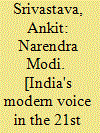

|
|
|
|
|
| Publication |
New Delhi, New Delhi Publishing House, 2021.
|
| Description |
307p.hbk
|
| Standard Number |
9789391857035
|
|
|
|
|
|
|
|
|
|
|
|
Copies: C:1/I:0,R:0,Q:0
Circulation
| Accession# | Call# | Current Location | Status | Policy | Location |
| 060032 | 954/SRI 060032 | Main | On Shelf | General | |
|
|
|
|
| 4 |
ID:
141850
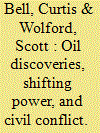

|
|
|
|
|
| Summary/Abstract |
Can the discovery of petroleum resources increase the risk of civil conflict even before their exploitation? We argue that it can, but only in poorer states where oil revenues threaten to alter the balance of power between regimes and their opponents, rendering bargains in the present obsolete in the future. We develop our claims via a game-theoretic model of bargaining between a government and a rebel group, where decisions over war and peace occur in the shadow of increasing oil wealth that both increases national wealth and shifts relative power in the government's favor. To test the model's main hypothesis, we leverage data on newly discovered oil deposits as an indicator of the state's expected future power resources. Our argument has important implications for the literature on credible commitments, power shifts, and violent conflict.
|
|
|
|
|
|
|
|
|
|
|
|
|
|
|
|
| 5 |
ID:
133994
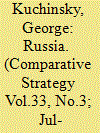

|
|
|
|
|
| Publication |
2014.
|
| Summary/Abstract |
Russia's current system of government is weakening. Putin's annexation of Crimea only masks this underlying trend. The system remains centered around Putin. Putin has effectively eliminated individual and institutional political rivals. But public criticism has become more diffuse and hard to neutralize. The impact of public opinion on driving the political process is growing and the opposition is expanding and coalescing. This is manifested through multifaceted forms of dissent and the growing influence of opposition leader Aleksey Navalniy. The dissent, which was initially fueled by prominent opinion makers, evolved into sporadic protests in key urban centers and political campaigns. Why did people who used to support Putin or were apathetic become critical to the point of speaking out and even engaging in opposition activity? The most likely catalyst was the 2008-2009 financial crisis. It undermined Putin's longstanding argument that an authoritarian system, with him at the helm, was necessary for economic advancement. Beyond economics alone, resentment is driven more generally by state incapacity-incapacity to strengthen the social safety net, improve public services, and effectively address corruption; violent crime; natural disasters; and terrorism-which increasingly contrasts Putin's stability narrative. Credible estimates and public perceptions indicate that corruption levels today exceed even those of the turbulent 1990's. Russia's leadership is known to be the key driver and beneficiary of this trend, which is also an important component that fuels discontent. The opposition has not organized into a political party and the government temporarily bolstered its popularity through outside intervention. This makes it hard for the opposition to dislodge Putin and for Putin to contain the opposition, which is creating an impasse. Russia is likely to be increasingly characterized by volatility-internally and on the international stage. This volatility positions the U.S. and the European Union to have greater influence on Russia but it's important for the West to understand how to take advantage of its already substantial leverage.
|
|
|
|
|
|
|
|
|
|
|
|
|
|
|
|
| 6 |
ID:
138304
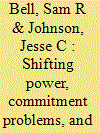

|
|
|
|
|
| Summary/Abstract |
Many scholars argue that leaders' expectations about future shifts in the distribution of power can result in preventive war. If a leader expects her adversary to be significantly stronger in the future, the leader may choose to go to war with that adversary rather than bargain with a stronger adversary in the future. However, quantitative evaluations of this argument prove difficult, as they require a measure of leaders' expectations about future shifts in power rather than simply a measure of observed power. In this paper, we develop an empirical model of future power to create this measure. We then use that measure to evaluate the preventive war hypothesis. Our results support the preventive war hypothesis. Increases in a state's expected future probability of winning in war increase its probability of another state in a dyadic relationship initiating war against it.
|
|
|
|
|
|
|
|
|
|
|
|
|
|
|
|
|
|
|
|
|